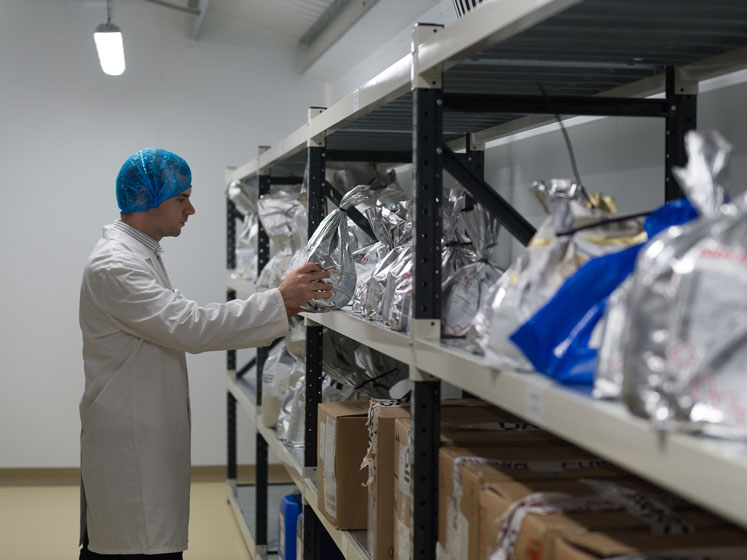Emma Verkaik, Membership and Marketing Director of the BCMPA — the Association for Contract Manufacturing, Packing, Fulfilment and Logistics — learns from its outsourcing members how their resilience has firmly established their position in the commercial mindset of their clients.
Roadblocks that develop into opportunities
In the early stages of the seemingly endless obstacles presented by the events of recent years, many clients of contract manufacturing organisations (CMOs) sought only one thing — the ability to continue their business. Even before 2020, health products and nutraceuticals were growing significantly in popularity; fuelled by numerous campaigns emphasising the importance of diet and well-being, this demand was heightened by the pandemic.
Supplements and vitamins (particularly vitamin D, nootropics and liposomal vitamin products) witnessed a huge increase in sales and were often delivered Direct to Customer (D2C) via ecommerce and fulfilment channels owing to the fast-changing retail environment.
From sourcing new/alternative ingredients and packaging materials as supplies became scarce to meeting the demands of a still growing sector, clients leaned increasingly heavily on the expertise of third-party outsourcing partners to find fast, effective solutions and get their products to market.
And it worked. Brands and retailers found that, despite supply issues and staff availability, they could meet the expanding demands of their customers by tapping into the agility, creativity and in-depth knowledge of third-party outsourcing firms, all without the need for excessive capital outlay on new equipment and a larger workforce.
Now, as we enter the second half of 2022, this dependable and effortlessly flexible resource has developed from an expedient, short-term last-minute fix into a powerful and effective foundation for the development of production, retail and brand businesses.

The continuing importance of this role is presenting both challenges and opportunities to BCMPA members as they see their services being adopted into the long-term strategic planning of their clients.
Collaboration, trust and transparency
As the third-party outsourcing industry builds relationships with clients that move from “fixing a problem” to “planning the future,” one of the key changes experienced by them is the willingness to share sensitive commercial data, often regarding strategic planning.
This has led to a much broader, more inclusive collaboration that, in turn, gives copackers and toll manufacturers better insight into the best ways to adapt their own offerings.
Gareth Lewis, Managing Director of Birkenhead-based, PharmaPac, has experienced this openness throughout his business: “The last 2 years have demonstrated the benefits that CMOs have brought to the delivery of a continued supply of nutraceutical goods and services for clients. The closer engagement of customers has firmly established us as a permanent and essential part of their business planning.”
The advantages of closer collaboration at a strategic level — and now at an earlier stage — are already delivering strong positive results.
Ed Ryle, CEO of Somerset’s Calleva Nutrition, is also experiencing this willingness to engage more openly with suppliers in the longer-term and sees the benefits it’s having on facilitating forward planning on both sides: “Having transparency and oversight of customer sales figures is really helpful when it comes to steering our own planning and making more informed decisions in terms of purchase agreements and stock holdings.”
New closer partnerships, new adapted capabilities
This closer working relationship has shone a spotlight on a raft of new opportunities for third-party outsourcing partners, as well as identifying key areas in which they can improve both their service and offering. Key amongst these is the delivery of reliable forward-planning models for clients in respect of production and warehousing capacity, staffing and supply-chain capability.
This in turn has provided CMOs with a more forensic focus on the areas within their businesses that require immediate attention to meet these new, more involved and long-term involvements.
Managing Director of Redrose Manufacturing Limited, David Goodings, highlights the importance of seamless collaboration: “We are constantly working more closely with our key customers to acquire forward visibility and forecasts when possible. Going forward, we prioritise orders for which we’ve received a forecast and/or production schedules as we’ll have already ordered and ring-fenced ingredients and other raw materials for that client.”

Planning for the future
Key to the ability to continue to deliver wider and more reliable products and services is maintaining necessary staffing levels and — where difficulties in this area exist — the introduction of automation to support growth. Ryle sees this as a dual-focus issue: “Staffing is probably still the number one challenge right now and getting it wrong has the potential to compound all the other challenges that businesses face regarding supply chain and lead times.”
“Automation is massively helpful when it comes to alleviating labour pressures, as well as increasing capacity and output. A cost/benefit analysis for the capital expenditure involved is clearly crucial, but the benefits and pay back periods indicated by our calculations all confirm that this is the right thing to do. As a result, our longer-term plans include further investment in automation and robotics.”
CMOs have long recognised the importance of securing robust staffing levels, working hard to explore as many resources as possible — including offering to retrain workers from other sectors and improving awareness of career prospects in their industry.
Lewis adds: “PharmaPac has worked increasingly closely with local colleges and universities to increase the awareness of the business in the community. We have provided work experience and internship opportunities for several people, including young adults with complex learning or physical disabilities."
"However, growth remains a key driver for the business and we are continually looking to invest in new equipment and processes that involve both extended capabilities and automation to the value of several millions of pounds.”
Vicky McIver, Managing Director at Power Health Products, is also overseeing planned developments in her firm’s capabilities: “We have recently built a brand-new factory to meet growth in both niche and more general demand (including several new lines), and ensured that automation forms a part of our new facility to futureproof our business against any potential staffing difficulties.”
Supply chain resilience
The last 2 years have demonstrated the benefits that CMOs contribute to the delivery of a continued supply of nutraceutical goods and services for clients, and this has necessitated great agility on their part in sourcing new, dependable onshore suppliers of raw materials and packaging. In addition, the need for full compliance is, of course, vital for these new supply chains, and the expertise of CMOs ensures that this is met.
Lewis highlights this key element: “All our chosen partners are appropriately and regularly audited by our team, and we choose only the most trusted global suppliers to give customers the highest level of quality and confidence. All requested testing is performed by our fully MHRA audited testing laboratory prior to its next stage in processing.”
Long-term relationships
The array of positive benefits of using third-party outsourcing specialists includes avoiding the need to incur costly capital outlay or investment at the beginning of a project, an advantage that appeals to many brands and retailers.
In addition, with frequent price fluctuations throughout the supply chain, it’s beneficial for customers to be able to agree longer-term fixed unit cost agreements and extended contracts for both production and distribution; this provides certainty in terms of forecasting and avoids the need for expensive — and perhaps speculative — expenditure on additional warehousing, labour and machinery.

The steps taken by CMOs to overcome these challenges also allow customers to take full advantage of an already established infrastructure. Vicky McIver says: “We are ordering and taking stocks in advance and placing additional pressure on our storage areas; but, we are happy to do this to ensure supplies and stock are available for our customer base.”
This “risk deferral” enables brands, retailers and entrepreneurs alike to explore new niche markets and products without the internal commitment previously required. This is only possible by their interaction with the highly skilled and adaptable third-party outsourcing community.
The future
The closer engagement of customers with CMOs has firmly established itself as a permanent and essential part of business planning. CMOs have confronted and overcome a host of challenges for clients — from material/logistics shortages and supply chain disruption to staffing issues — and have delivered solutions in difficult trading climate.
The flexibility to create or reduce capacity as the market needs remains key to the success of brands, retailers and manufacturers. Third-party CMOs are busy adapting and finessing their offerings to continue to facilitate this.
Goodings confirms this: “Our forward-thinking compliance, regulatory and technical support, continuing website development and increased flexible production capabilities have forged key and critical business relationships with clients, and we plan for this to continue to develop indefinitely.”
BCMPA members are observing that customers are no longer seeking tactical solutions to short-term issues; they’re looking for deeper and more strategic commercial relationships, ensuring that both parties have the ability to secure materials and long-term capacity to grow and feed the demands of the nutraceutical market. This makes for a far healthier and more successful collaboration between CMOs and their customers.
